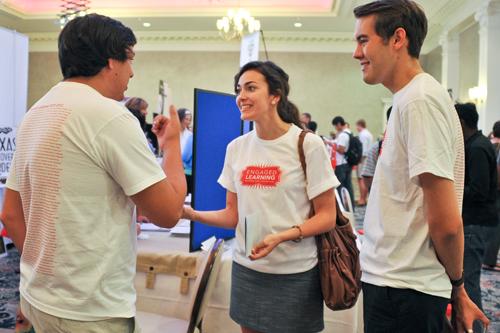
Students visited the Umphrey Lee Ballroom on Monday to learn more about Engaged Learning projects. (Sidney Hollingsworth/The Daily Campus)
Learning went beyond the classroom for more than 100 students in 2012.
SMU’s Engaged Learning Expo, which took place on Monday, showcased students, professors and their projects.
The event also hosted 45 DFW community-partner and 15 campus programs that offer volunteer opportunities to students.
The Engaged Learning Expo highlighted the possibilities for students who are interested in learning and making a difference beyond the classroom.
SMU President R. Gerald Turner made an appearance, along with Provost Paul Ludden and Director of Central University Libraries Gillian McCombs.
Dean of Graduate Studies James Quick presented the first Excellence in Mentoring Award, and introduced SMU’s first undergraduate research director.
A love for learning and a passion to help others are two common themes among Engaged Learning students.
Kimberly Mendoza traveled to Guatemala for six weeks to study the culture, beliefs, traditions, and medicinal remedies of the indigenous Maya.
“I’m half indigenous Maya. Going back to my homeland made me want to realize the difference between Western medicine and cultural medicine,” Mendoza said.
Mendoza learned about many traditions that have been passed down through generations. She says her research also led her to learn more about herself.
“[What I learned] helps my ultimate goal of being a medical doctor and professor, teaching future medical students about interactions that they may have with different cultures of the world,” Mendoza said.
Marissa Ocanpo provides another example of the real-world possibilities that Engaged Learning students can achieve. Ocanpo, a senior planning to graduate this December, worked as a public health intern at La Isla Foundation in Leon, Nicaragua.
Ocanpo participated in a causality study, which focused on identifying the cause of chronic kidney disease (CKD) and implementing preventative policy measures.
The cause of CKD in undeveloped countries is currently unknown.
In addition to participating on a team investigating the potential conditions contributing to CKD, Ocanpo also conducted research into the nature and progression of the disease itself.
Ocanpo now believes that CKD is a terminal disease which eventually becomes irreversible.
“It is not realistic to focus on treatment”, Ocanpo said. “It has to be prevention. We need to focus on changing the conditions that lead to CKD.”
Psychology major Ankita Krishnan participated in an internship in India through Action for Autism. Krishnar believes that her Engaged Learning project offered her an opportunity unique from that of the classroom.
“Going into the field can never be replaced by a lecture or textbook”, Krishnar says. “It is an experience you can never get anywhere else.”
Susan Kress, director of Engaged Learning, strongly encourages students to apply to Engaged Learning.
“It’s everything you can learn in college, times two,” Kress said. “Just do it.”
In addition to being an opportunity for growth beyond the classroom, Engaged Learning projects can open doors for students after graduation.
Kress points out that two out of three of the Engaged Learning students who graduated last year received jobs from the organizations they completed their projects through.
Other students, such as Krishnan, value the experience as preparation for graduate school.
The next Engaged Learning event is a workshop series titled “What’s in it For You,” taking place on Sept.17.
There will be sessions for both faculty members and students. An additional workshop, “Get Engaged,” will be held on Nov. 15.








